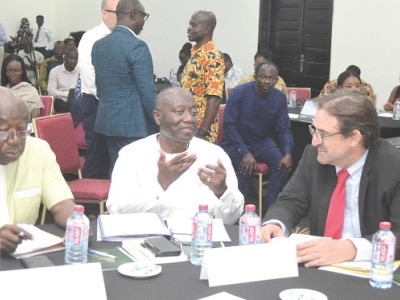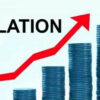In the wake of unsustainable debt levels, high inflation resulting in Eurobond market blackout and high policy rate stiffling business growth, some actors of the Ghanaian economy are confident in the recovery efforts.
Their confidence is dependent on the continuous downwards trend in inflation, positive Gross Domestic Product (GDP) growth, the IMF approval of first review of Ghana’s economy in the Extended Credit Facility program.
In a Facebook post last week, a deputy finance minister jubilated the unanimous approval of Ghana’s request for debt treatment under the G-20 Common Framework, viewing it as a foundational step for the nation’s economic outlook. To this, the minister indicated confidence in Ghana’s economic recovery, highlighting recent positive developments concerning the receipt of the second tranche of the International Monetary Fund’s bailout.
“I commended Ghanaians for their steadfast support of government measures and policies, particularly in addressing challenges posed by the COVID-19 pandemic and the Russia-Ukraine war”, Dr John Kumah has expressed. “I acknowledge the role played by Ghanaians in mitigating adverse impacts, expressing optimism for a brighter future.”
Also, the Bank of Ghana Governor, Dr. Ernest Addison, while acknowledging the challenges ahead, expressed confidence in the ongoing economic recovery process. Stressing the importance of executing necessary structural reforms to support a more efficient functioning of the economy, ensuring long-term sustainability.
Hailing the effectiveness of its efforts, the Central Bank anticipates a further easing of inflation in 2024, supported by the continued implementation of sound policies until inflation expectations are firmly anchored towards the single-digit objective. A notable improvement has been observed over the past year, with inflation dropping from around 54 percent to 23 percent by the end of 2023.
In a brief statement following the completion of the First Review of the Extended Credit Facility (ECF) Programme with the International Monetary Fund (IMF) last week, Dr Addison emphasised the central bank’s commitment to monitoring domestic and external developments.
Commenting on the banking sector, he reassured that, the sector remains sound, liquid, and profitable. He said the Bank of Ghana will closely monitor banks’ efforts for capital restoration, particularly in light of the impact of the Domestic Debt Exchange Programme (DDEP).
Dr. Addison expects early recapitalisation to enhance banking sector resilience and facilitate effective financial intermediation, contributing to macroeconomic recovery.
Consequently, the Deputy Finance Minister in his post further indicated that, the approved debt treatment sets the stage for sustained economic progress, anticipating benefits for the citizens of Ghana.
He mentioned the importance of the debt treatment in confirming Ghana’s public debt on a sustainable trajectory, paving the way for further fiscal prudence and debt restructuring measures.
Dr Kumah cautioned that while the decision of the Official Creditor Committee (OCC) to support the government’s efforts is commendable, more work needs to be done going forward.
He outlined the next steps, including the signing of a Memorandum of Understanding (MoU) between the Government of Ghana and the OCC and ongoing negotiations on commercial debt (Eurobonds).
Looking ahead, Dr Addison urged the country to prepare for the second review of the program and emphasised the critical role of structural reforms in achieving a well-functioning and sustainable economy.
























